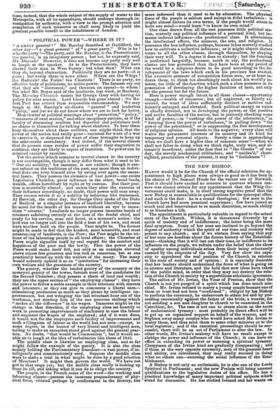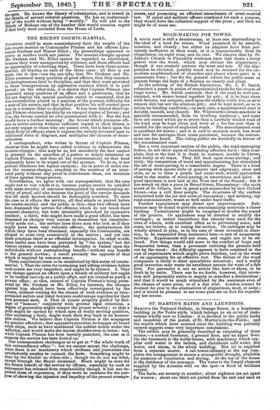THE NEW BISHOP.
HAPPY would it be for the Church if the official selection for ap- pointment to high places were always so good as it has been in the choice of Dr. Samuel Hinds for the vacant see of Norwich. That it should have excited no censure in quarters whence cen- sure was almost certain for any appointment that the Whig Go- vernment could make, is in itself strong negative proof that the new Bishop is unassailable in qualifications for the episcopal office. And such is the fact : he is a sound theologian; few men in the Church have had more practical experience ; few have joined so much zeal and benevolence to so much discretion, so much ability to so blameless a life.
The appointment is particularly valuable in regard to the actual state of the Church. Within, it is threatened diversely by a spirit of zealotry and of indifference; the latter being the more fatal symptom. Some of her sons are inclined to go beyond the degree of authority which the spirit of our time and country will permit to any church ; and if we abstain from saying that any of her sons are heedless about the future history of ther'Establish- ment—thinking that it will last out their time, or indifferent to its influence on the people, we refrain under the belief that the show of apathy among individuals arises from their being reluctantly coerced by the etiquette of the day. Very few show the capa- city to apprehend the real position of the Church in relation to the state of society and of opinion : it is especially desirable that her leaders should understand the force of what is going on in science and literature, and the hold that new ideas have taken of the public mind, in order that they may not destroy the rela- tion of the Church to society by a supercilious scholastic ignorance. The sallies of Mr. Irvine, the Vicar of Preston, show that the Church is not yet purged of a spirit which has done much mis- chief. Mr. Irvine refused to marry a young couple because one of them at least had not been " confirmed " ; obliged by his Bishop to perform the ceremony, he endeavours to attain his end by pro- ceeding canonically against the father of the bride, a weaver, for not sending a son and daughter to church to be examined in the Catechism, &c. The case is not one to create alarm on the score of ecclesiastical tyranny : most probably its direct effect will be to get up an organized support on behalf of the weaver, and to frighten away many couples who would have asked Mr. Irvine to marry them, and thus send them to some other minister or to the local registrar ; and if the canonical proceedings should be suc- cessful, there will be an act of Parliament to alter the law. In other words, Mr. Irvine's zealotry will have no result except to abridge the power and influence of the Church ; it can have no effect in extending its power or restoring a spiritual tyranny. Clergymen of the Irvine kind are gradually disappearing; and if those at the very opposite extremity, men of the greatest heart and ability, are introduced, they may really succeed in doing what no others can—restoring the social influence of the Esta- blishment.
A Bishop is not only an ecclesiastic, he is also one of the Lords Spiritual in Parliament ; and the new Prelate will bring unusual qualifications to the legislative duties of his office. He has a practical knowledge of many important political subjects which stand for discussion. He has studied Ireland and her wants on
the spot. He knows the theory of colonization, and is versed in the details of several colonial questions. He has an understand- ing of the world without being " worldly." He will add to the Bench of Bishops one of the number that would occasion regret if that body were excluded from the House of Lords.



























 Previous page
Previous page